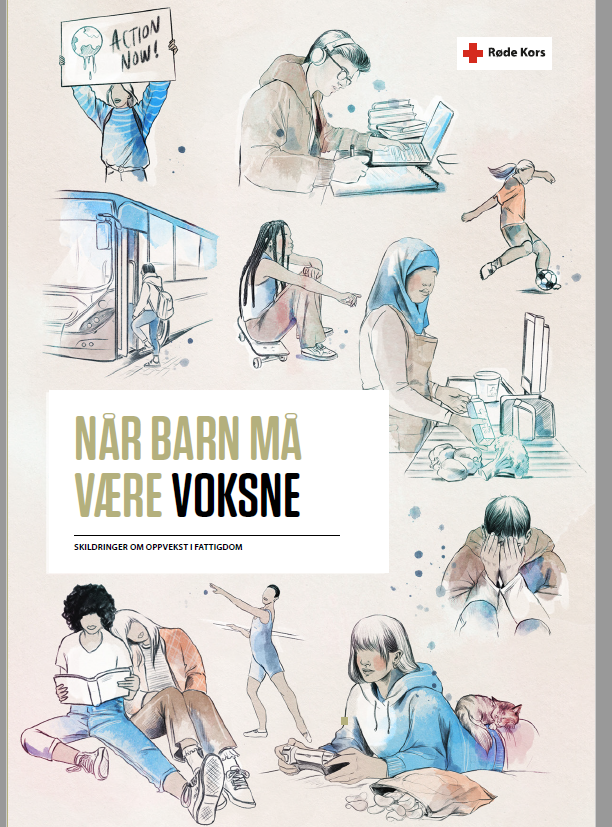“When children have to be adults” about growing up in low- income families

Main purpose of report
The main purpose of the report “When children have to be adults” about growing up in low- income families is to convey the experiences of those who have known the challenges of growing up in low-income families firsthand, to help ensure that their voices are heard. A large part of this report is therefore devoted to interviews with eight young adults where they talk about their experiences from school and leisure, their future plans and recommendations.
Methodology
In the work on the report, the Norwegian Red Cross conducted in-depth interviews with eight young adults aged 18 to 26, as well as conducting a nationwide survey among young people in the age group 15 to 25 about growing up in low-income families. The survey had 214 respondents.
Main findings
The report describes how young people have been kept out of important arenas for learning and missed out on important experiences both at school and in their free time, due to their family’s lack of financial resources.
School constitutes a large part of growing up, and it lays a very important foundation for adult life. From the survey we learn that 4 out of 10 of the respondents in the survey often dreaded going to school. In the interviews, the Red Cross learns about situations in school where young people had experienced inequalities were made visible and reinforced. They tell stories of not being able to join school trips and after-school program (SFO) because of the family’s poor finances.
The survey shows that those who dreaded going to school growing up are less satisfied with their current lives than those who did not dread it.
Among the young people who were interviewed, several said that they could not make use of the offer of school meals or school milk where this was available, because their parents could not pay for it. In such situations, school meals went from being a healthy offer for pupils to a marker of marginalization. The survey shows that the vast majority rely on taking packed lunches from home to school. What is in the fridge at home is therefore decisive for the contents of the intake of food that day in school. Food and varying access to food are often central themes in the stories the young people tell.
In the interviews, young people talk about free time activities they had to give up. There was no room in the family economy to pay for membership, equipment, bus tickets or training fees. Although attempts were made to finance the free time activities with the help of own part-time jobs, financial support from friends and acquaintances or agreements with trainers, these were not solutions that could sustain participation over time.
From social life outside school and free time activities, the Red Cross hears stories of having dreaded birthday parties with accompanying gift expectations, and of making up stories about going on holiday trips in order not to feel different. In the survey, we see that 4 out of 10 children and young people from low-income families feel they do not have the same opportunities as others for holiday experiences. Almost 1 in 6 feel marginalized due to poor finances.
The young people describe that growing up in a family with a low income has affected them a lot. It has influenced the choices they have made, the ideas they have about education and future work life, and how they see the future. Some talk about how growing up has affected their mental health and about difficulties in separating their parents’ challenges and problems from their own.
The Norwegian Red Cross learned about how the young adults had developed a strained relationship to finances in young adult life, and about problematic encounters with the welfare services throughout their upbringing. Several have very “adult” concerns, and the survey shows that over 25 percent were quite, very often or always worried about economy issues when growing up.
The most heart-warming stories from the interviews appear when the young people talk about people who were there for them throughout their childhood and young adult life. Grandparents, friends’ mothers, neighboring families, teachers and coaches have shown them great care and given concrete help in difficult periods and situations.
The report illustrates how important the care and concern from fellow human beings are, but it also shows that the systems in school, in free time activities and in the welfare services must be better designed to meet the needs of children and young people who grow up in low-income families. Getting the help you need as a child should not be left to the roll of the dice.
Recommendations
The report includes a long list of recommendations gathered from the youths through the interviews and the survey.
A free school meal, free after-school programs (SFO) and better financial support to low-income families are high priorities. There are also several concrete and practical recommendations from the youth, such as
· More information to the municipality and schools about free time activities, support schemes, and opportunities for holiday activities.
· Food distributions should be available close to where you live, also outside the cities. Not everyone has a car.
· To teachers and other adult in places where children and young people spend time: ask us how we are doing.
· Talk to the school nurse not only about how you are feeling, but also about possibilities.
· Find someone to talk to, seek help. It is important to find a place where you can talk without having to worry about your parents.
